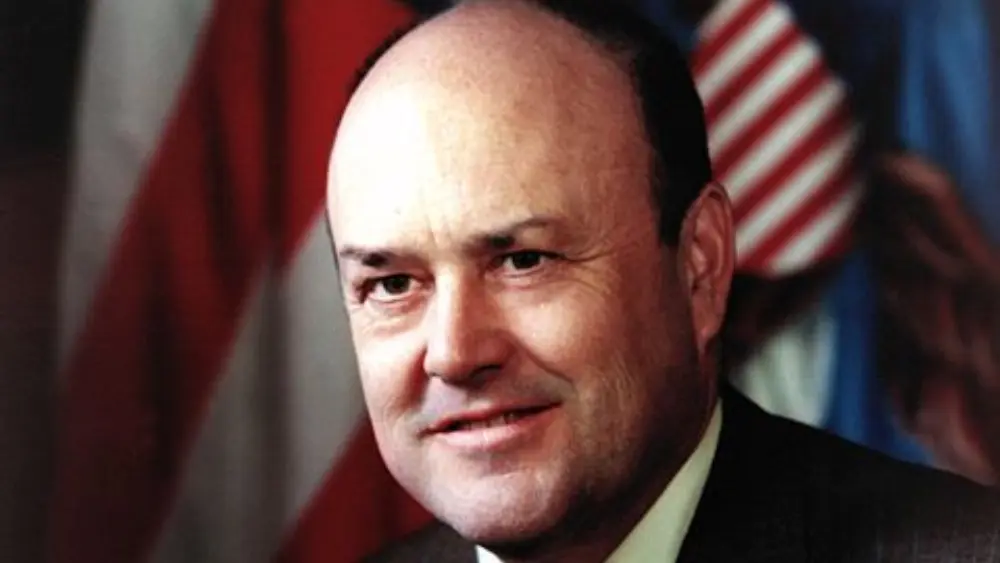Melvin Robert Laird, born on September 1, 1922, in Omaha, Nebraska, was a pivotal figure in American politics, serving as the Secretary of Defense during an unruly period marked by the Vietnam War. Laird’s tenure at the helm of the Department of Defense (DoD) was characterized by strategic decision-making, policy reforms, and efforts to address the challenges of an increasingly divisive conflict.
Early Life and Military Service
Melvin Laird’s journey into public service commenced with his military service during World War II. Enlisting in the U.S. Navy, Laird’s time in the armed forces was a formative period that deeply influenced his perspectives on national defense and instilled in him a profound sense of duty to his country. This early experience provided Laird with firsthand knowledge of the sacrifices and challenges faced by those in the military, setting the stage for his future contributions to the defense and well-being of the nation.
Laird’s military service not only honed his understanding of the strategic and operational aspects of national defense but also cultivated a strong sense of patriotism. His commitment to serving in the Navy during a pivotal moment in global history laid the foundation for a distinguished career in public service, where Laird would go on to play key roles in shaping U.S. defense policies and priorities.
Melvin Laird: Entrance into Politics
Following his military service in World War II, Melvin Laird seamlessly transitioned into politics, representing Wisconsin’s 7th congressional district in the U.S. House of Representatives from 1953 to 1969. Laird’s early political career was characterized by a steadfast commitment to fiscal conservatism and a keen focus on national security issues. Drawing on his military background, he brought a unique perspective to the realm of politics, advocating for policies that reflected his understanding of the strategic and budgetary aspects of national defense.
During his tenure in the House of Representatives, Laird gained a reputation as a pragmatic and principled legislator. His advocacy for responsible fiscal policies and his attention to national security matters garnered respect across party lines. Laird’s transition from military service to political leadership marked the beginning of a multifaceted career dedicated to shaping policies that would impact the nation’s defense, fiscal responsibility, and overall well-being.
Appointment as Secretary of Defense
In 1969, President Richard Nixon appointed Melvin Laird as the 10th Secretary of Defense. Laird assumed this pivotal role during a challenging period in U.S. history, with the Vietnam War casting a significant shadow over the nation’s foreign policy and military engagements. Tasked with overseeing the Department of Defense, Laird confronted the complexities of managing a conflict that had become deeply divisive both within the United States and on the international stage. His tenure as Secretary of Defense would be marked by efforts to address the challenges posed by the Vietnam War while simultaneously addressing broader issues related to defense policy and strategy.
Laird’s appointment as Secretary of Defense placed him at the forefront of decision-making during a critical juncture in U.S. military history. Faced with the complexities of the Vietnam War and the need for a strategic reevaluation, Laird worked to implement policies that would shape the military’s role in a changing geopolitical landscape. His leadership during this period reflects the delicate balance required to navigate the complexities of wartime decision-making and the broader responsibilities associated with managing the nation’s defense apparatus.
Melvin Laird: Vietnamization Policy
One of Melvin Laird’s most notable contributions during his tenure as Secretary of Defense was the development and implementation of the Vietnamization policy. Recognizing the need for a strategic shift in the U.S. approach to the Vietnam War, Laird devised a plan to gradually transfer the responsibility for combat operations to the South Vietnamese forces. The Vietnamization policy aimed to build the capacity and capabilities of the South Vietnamese military, enabling them to take a more active role in defending their own country. This approach was designed to pave the way for the phased withdrawal of U.S. troops, aligning with President Nixon’s broader goal of extricating the United States from the prolonged and controversial conflict.
The Vietnamization policy represented a pragmatic response to the challenges posed by the Vietnam War. It sought to address both the military and political aspects of the conflict by empowering South Vietnam to take greater control of its own defense while facilitating the reduction of U.S. military involvement. Laird’s role in shaping and implementing this policy reflected his commitment to finding a responsible and sustainable exit strategy from a war that had deeply divided the nation.
Defense Reforms and Policy Initiatives
Melvin Laird’s tenure as Secretary of Defense was marked by a series of impactful reforms and policy initiatives within the Department. Recognizing the importance of budgetary discipline, Laird worked to streamline military operations and modernize the armed forces. His reforms aimed to strike a balance between maintaining military strength and ensuring fiscal responsibility, aligning with his commitment to prudent financial management.
Laird’s approach to defense reforms included efforts to make the military more efficient and adaptable to contemporary challenges. By modernizing equipment, improving training methods, and optimizing the organizational structure, he sought to enhance the overall effectiveness of the armed forces. These initiatives reflected Laird’s pragmatic leadership style, prioritizing both national security and responsible fiscal stewardship in an era marked by evolving geopolitical dynamics and budgetary constraints.
Melvin Laird: Nixon Administration and the Pentagon Papers
Melvin Laird’s tenure as Secretary of Defense occurred against the backdrop of the publication of the Pentagon Papers, a comprehensive and classified study of U.S. political-military involvement in Vietnam. The Pentagon Papers, leaked by military analyst Daniel Ellsberg in 1971, revealed internal contradictions in the government’s public statements about the Vietnam War and unveiled a history of decisions that escalated U.S. involvement. Despite the controversy surrounding the disclosure, Laird remained a staunch defender of the Nixon administration’s policies, including those related to the Vietnam War.
In the face of the Pentagon Papers’ revelations, Laird maintained his commitment to supporting the administration’s positions and policies. His defense of the government’s stance reflected both a loyalty to the leadership under President Richard Nixon and a determination to uphold the decisions made during a challenging period in U.S. history. The Pentagon Papers incident underscored the complexities and controversies surrounding the Vietnam War, and Laird’s response highlighted the role of key officials in navigating and defending the administration’s actions in the midst of public scrutiny.

Post-Defense Career and Legacy
Following his departure from the Pentagon in 1973, Melvin Laird continued to play a significant role in public life. Embracing his wealth of experience in defense and foreign affairs, he served as a senior counselor for national and international affairs at the Center for Strategic and International Studies (CSIS), a prominent think tank. In this capacity, Laird contributed valuable insights to discussions on global security, defense policy, and international relations. His post-defense career demonstrated a commitment to ongoing public service and a dedication to addressing the complex challenges facing the nation and the world.
Melvin Laird’s legacy extends beyond his time as Secretary of Defense, encompassing his contributions to shaping national security policies and fostering a nuanced understanding of defense issues. His pragmatic and disciplined approach to defense management, coupled with his commitment to fiscal responsibility, left a lasting impact on the Department of Defense. Laird’s post-defense career further solidified his reputation as a statesman and strategic thinker, contributing to the broader discourse on U.S. foreign policy and national security.










